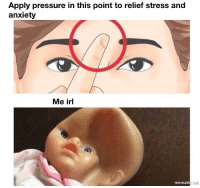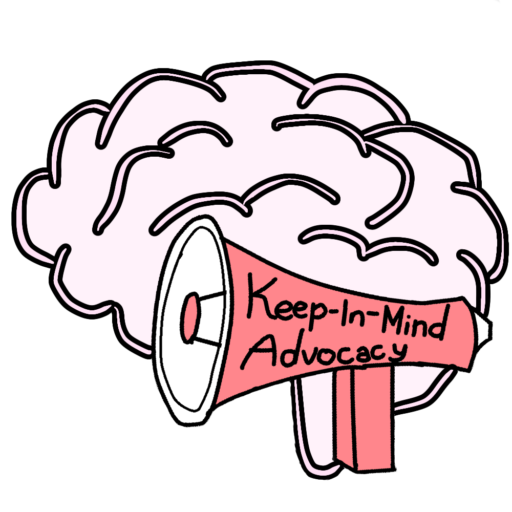DISCLAIMER. THIS IS MY OPINION. Unless stated by a source, it is all opinion-based. Do not use these, if stated otherwise by your doctor. Talk to your doctor prior to using these.
Many people have seen the memes that surround pressure points and anxiety, right? Like this one: I saw it once again for the first time in a really long time, and it reminded me of how important it is that we talk about the science behind these things. Some of the things that we read online can potentially be extremely dangerous. This is why we should research (and say in easier words) why things are this way.
I decided to research the pressure points to reduce anxiety and the reasoning behind them. Here’s what I found.
According to Healthline (Raypole, 2018), there are many spots for acupressure. The “hall of impression” point, which is used to reduce both anxiety and stress. It is located between your forehead, just like the meme says.
Another acupressure point is called “The heavenly gate point”. According to Raypole, “The heavenly gate point is located in the upper shell of your ear, at the tip of the triangle-like hollow there. Stimulating this point is said to help relieve anxiety, stress, and insomnia.”
The “shoulder well point” is in your shoulder muscle. “To find it, pinch your shoulder muscle with your middle finger and thumb. This pressure point is said to help with relieving stress, muscle tension, and headaches. It can also induce labor, so don’t use this point if you’re pregnant,” Raypole says.
The “union valley pressure point” is supposed to also help. Raypole says, “You find this pressure point in the webbing between your thumb and index finger. Stimulating this point is said to reduce stress, headaches, and neck pain. Like the “shoulder well point”, it can also induce labor, so avoid this point if you’re pregnant.” A lot of these things seem to induce labor.
The second last pressure point that the article says, is called the “great surge” pressure point. It is located in your foot, about two-three finger widths between where your big toe and second toe meet. According to the article, it may help with anxiety, stress, pain, insomnia, and menstrual cramps.
About three finger widths below your wrist, the last pressure point lies. It is called the “inner frontier”. It is said to help reduce anxiety, and can relieve nausea and pain, Raypole confirms.
Now. Why does it work?
Apparently, the science behind it isn’t very large. However, a review study, done by the scientists Doreen W H Au, Hector W H Tsang, Paul P M Ling, Christie H T Leung, P K Ip, and W M Cheung in 2015, says that it helps depending on the magnitude of the anxiety. The higher the level, the less likely the acupressure points will work. Regarding going into surgery, they stated that it helped to reduce 39 patients’ pre-surgery anxieties.
In 2018, the most recent study done on acupressure points, doctors Maryam Hassanzadeh-Bashtian, Talat Khadivzadeh, Shapour Badiee-Aval, and Habibollah Esmaily, discovered that it helped women undergoing fertility treatments. While they were undergoing in vitro fertilization/intracytoplasmic sperm injection (IVF/ICSI), it is said that the acupressure points helped bring down the anxiety, as they were receiving it.
At the moment, the understanding of acupressure points is hardly known. There is much more to learn about it, but since the science behind it isn’t as concrete, we just have to wait and see.
Raypole, Crystal. “Pressure Points for Anxiety: 6 Points to Try for Relief.” Healthline, www.healthline.com/health/pressure-points-for-anxiety#research.
Au DW, Tsang HW, Ling PP, Leung CH, Ip PK, Cheung WM. Effects of acupressure on anxiety: a systematic review and meta-analysis. Acupunct Med. 2015 Oct;33(5):353-9. doi: 10.1136/acupmed-2014-010720. Epub 2015 May 22. PMID: 26002571.
Hassanzadeh-Bashtian, Maryam et al. “The Perception and Experience of Infertile Women Who Received Acupressure in Relation to Anxiety: A Qualitative Study.” Iranian journal of nursing and midwifery research vol. 23,5 (2018): 376-381. doi:10.4103/ijnmr.IJNMR_30_18


Comments are closed